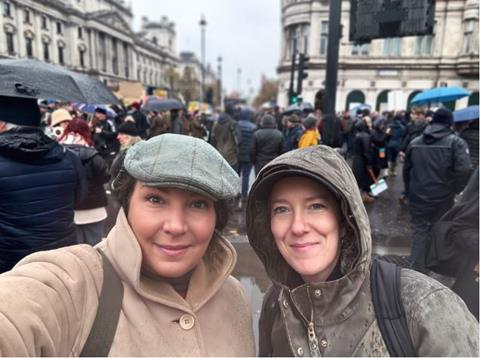‘The Christian principle of solidarity comes from 1 Corinthians 12, and urges us to consider every member of the body of Christ and by extension of society - remembering those who are in fact indispensable and who deserve special honour,’ says Alex Noel, as she stands in solidarity with UK farmers.

I can’t remember the last time I set foot on a farm. In fact it’s been a while since I even visited the countryside. So you might wonder why this born-and-bred urbanite decided to join the tens of thousands of farmers who descended on Westminster to protest against farm inheritance tax on 19th November? I wanted to attend the protests to stand in solidarity with another Christian woman and good friend Lisa Martin, who farms alongside her husband Tom in Cambridgeshire.
I was aware too that my daily life, like virtually all of us (no matter how dislocated from the countryside), is shaped by farming
I was aware too that my daily life, like virtually all of us (no matter how dislocated from the countryside), is shaped by farming. I eat food grown and reared on farms every single day, and visit shops and supermarkets full of farm produce albeit processed, shrink-wrapped and packaged - leaving little memory of where it came from. And though I live in London, my family is shaped by farming too; in my paternal grandmother’s case farming goes back generations.
It takes something major for farmers to up-sticks and come to London (the last time this many descended on Westminster was 22 years ago to protest the hunting ban). The reason for the recent protests of course is chancellor Rachel Reeves’ introduction of a 20% inheritance tax on farms worth over £1million. It’s a shock for farmers - farms have been exempt since 1992. And the value of land and other agricultural assets doesn’t automatically translate into ready cash; it can be a constant struggle to survive.
In trying to raise taxes for public services such as the NHS, the government has contributed to an ongoing narrative that farmers are overlooked by those in Westminster. As a result, Labour has been accused of being urban-minded and out of touch with the countryside. Something clearly felt by the UK’s farming community; every one of those marching on Westminster represented others - families and workers - who couldn’t attend. One young farmer I spoke to had come up from East Devon to represent his family - his parents were back home on the farm.
Regardless of the assurances of the government and the additional funding they have promised, the felt experience of farmers is that they are misunderstood by politicians and sidelined by the policy decisions made in Westminster. It adds a further layer of disenfranchisement for those on whom our predominantly urban population are dependent, while having little meaningful connection to them.
Farming is a precarious business. Farmers deal with a high level of risk on a near-consistent basis; they perennially battle the weather and other factors beyond their control.
Farming is a precarious business. Farmers deal with a high level of risk on a near-consistent basis; they perennially battle the weather and other factors beyond their control. Sometimes they can only hope and pray for a good harvest, with any profits so easily derailed by a bad one. The supermarkets they supply squeeze prices to stay competitive, and offer few guarantees - willing to cancel orders at a moment’s notice, even though farmers have been working towards them all year. That’s not to mention the pests and diseases that can wipe out crops and livestock. These tax increases add a further level of risk to a business already fraught with it.
Read more on taxes
Rumoured changes to council tax discounts raise biblical questions of compassion and fairness
The Christian principle of solidarity comes from 1 Corinthians 12, and urges us to consider every member of the body of Christ and by extension of society - remembering those who are in fact indispensable and who deserve special honour. And to stand with those who are suffering. Verse 26 neatly sums it up: “If one member of Christ’s body suffers, all suffer. If one member is honoured, all rejoice”.
Lisa highlighted the suffering this budget could bring to farmers in an Instagram post, saying: “Farms like our family farm [in Cambridgeshire] aren’t just businesses - they are homes, legacies and lifelines. Tom’s family has nurtured this land, cared for it, and passed it down for over 150 years. Backbreaking hard work won this farm! Now, this government is asking many to sell and to pay a tax they can’t afford. They know it will negatively affect many family farms. They know it.”
The inheritance tax changes present an existential threat to farmers, their families, way of life and their very identity too. Farmers are hefted to the land; much like the crops and livestock they farm they are indivisible from it. They fear losing much more than 20% when farms pass from one generation to the next. If land and homes do indeed need to be sold to offset the levies, they would lose a part of themselves and their history; reducing the value and earning potential of the very thing they were pinning their futures on.
For the next generation of farmers inheritance isn’t just a nice bonus on top of what they already have, it’s their very lives and livelihoods.































2 Readers' comments